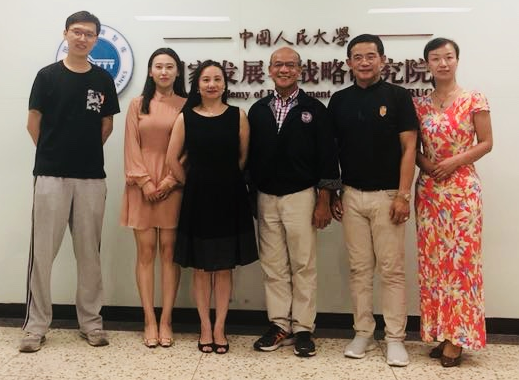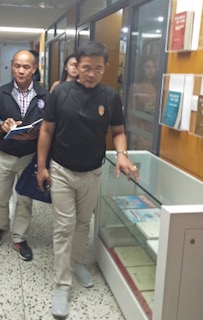 Research Update
Research Update
10
JulyOn June 23, General Sulasi Tanatong, Director of the Thai-Chinese Strategic Research Center of the National Research Council of Thailand, Chang Xiang, Research Fellow of the Thailand-China Strategic Research Center of the National Research Council of Thailand, and Feng Zhiwei, Deputy Director of the International Exchange Office of the Royal University of Surat Thani, visited the National Academy of Development and Strategy of Renmin University of China, and Prof. Xu Qinhua, Deputy Dean of the NADS, Jin Huiying, Assistant of Internatioal Affairs, Wang Jijie, research fellow of BRI research center of NADS, Ms Liu Yehua, international department of China Renmin University Press held a discussion.

During the discussion, General Sulasi Tanatong commented on the relations between Thailand and China. He believed that "Chinese and Thai are family" is a true portrayal of the relationship between Thailand and China. Thailand and China maintain multi-level friendly relations. On the royal side, Princess Sirindhorn has long promoted the cultural and educational exchanges between China and Thailand, and was rated as “China's Top Ten International Friends”. On the government side, the two governments exchanged high-level visits closely. Thai Prime Minister Pajue Osama paid multiple visits to China and received warm welcome from Chinese leaders. On the private front, the number of Chinese tourists to Thailand has grown rapidly year by year. Face-to-face exchanges have made the Chinese and Thai people gain deeper understanding and become more affectionate.
The foundation of cooperation between China and Thailand is non-governmental friendship. The foundation of development is strategic docking. The win-win approach is regional cooperation. Both Thailand and China are developing countries. Although the two countries have different political systems and national conditions, they all face common problems in eradicating poverty, improving the living standards of the people and promoting regional peace and stability. In 2012, Thailand and China established a comprehensive strategic partnership. In 2013, China proposed the “Belt and Road Initiative” and established Thailand as a country along the “21st Century Maritime Silk Road”. In 2017, Thailand and China signed the third “Strategic Cooperation Plan”(2017-2021). It can be seen that the in-depth cooperation between Thailand and China in infrastructure and economic trade in recent years cannot be separated from a solid strategic docking.
The proposal of China's "One Belt One Road" initiative has also provided a new historical opportunity for the comprehensive cooperation and development of Thailand and China. In order to promote national development, the Thai government has proposed a 20-year national strategy and Thailand 4.0 strategy, and launched the “Eastern Economic Corridor” as a pilot area for industrial upgrading. This is similar to the development concept of “Made in China 2025” and “China-Indochina Economic Corridor” proposed by the Chinese government, so there is a large space for cooperation and development in the region.
Thailand and China have different resource endowments and have great complementarities. The Thai-Chinese research institutions and think tanks have developed rapidly in recent years, providing important intellectual support for cooperation between Thailand and China in political, military, economic, and cultural fields. Under the background of the “Belt and Road”, the further deepening of cooperation between Thailand and China is inseparable from the efficient and professional intellectual support of the think tanks of the two countries. Studying the national development guiding ideology and national development strategy of Thailand and China, especially the research on the “Belt and Road” will help promote the strategic integration of Thailand and China.
Admiral Sulaci Tanatong’s speech won the unanimous approval and high appreciation of all experts. After the discussion, General Sulasi Tanatong visited the office area of the NADS from 8:00 to 9:00 pm. Professor Xu Qinhua gave a detailed introduction to the composition of the NADS, research brand, and International cooperation and achievements.

Admiral Sulaci Tanatong said that after visiting the National Academy of Development and Strategy of Renmin University of China, he felt that the NADS is a comprehensive and influential think tank. Currently in China, BRI, national development strategies, and research in the field of government policy have great implications for Thailand. The purpose of the Thai-Chinese Strategic Research Center (TCRC) of National Research Council of Thailand is to study the strategic docking and regional cooperation between Thailand and China. Therefore, he believes that the exchange and cooperation between TCRC and NADS, as well as the planning of the “One Belt One Road” Research Center of the China-Thailand Joint Venture, will become the model of cooperation for think tanks of Thailand and China..